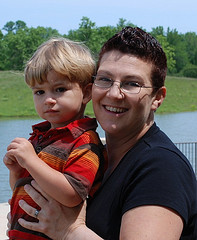By Rita Brhel, managing editor and attachment parenting resource leader (API)
 According to cultural standards, I am not an adult, even though I am many years out of school, own my home, have been married for nearly a decade, and have two children. The reason is, I still seek out my mother’s advice on a regular basis. I ask for tips in marriage, suggestions in managing money, and guidance in navigating life’s hardest moments. If being an adult means that you are able to live emotionally independent of the parents that raised you, I am far from grown up.
According to cultural standards, I am not an adult, even though I am many years out of school, own my home, have been married for nearly a decade, and have two children. The reason is, I still seek out my mother’s advice on a regular basis. I ask for tips in marriage, suggestions in managing money, and guidance in navigating life’s hardest moments. If being an adult means that you are able to live emotionally independent of the parents that raised you, I am far from grown up.
This is why it was so refreshing to read Don’t Bite Your Tongue: How to Foster Rewarding Relationships with Your Adult Children by Ruth Nemzoff, a grandmother who believes that parenting doesn’t end just because your child turns 18 or 21 years old, gets married, or gives birth to her own children.
Last fall, I talked with Ruth about her views of Attachment Parenting when the kids leave home:
RITA: Ruth, your book definitely fills a need in parenting information — what to do when our children reach the age of adulthood. Your book helps fill the gap for both generations. You mention that your professional studies have mostly been with mothers of children with disabilities. How did this book come about?
RUTH: When my first child got married, everyone came up to me and said to keep my mouth shut and my pocketbook open. I thought that was terrible advice, because what was happening was a change in the relationship with my child and this new person was entering the family with whom I had an entirely new relationship. Plus, I thought that comment was terribly insulting. I didn’t want my relationships with my children to be about giving them money. That’s what first got me thinking about relationships with adult children being a mix of obligation and choice.
When I wrote the book, I wrote it definitely for the grandparent generation. What I found is that when adult children who are parents read the book, they get so much out of it.
RITA: How so?
RUTH: The three-generation relationship — grandparent-parent-child — is incredibly important, because it can either facilitate parenting or debilitate parenting.
For example, when a new baby comes, it’s very important to clarify roles ahead of time. The grandparent may come in and expect to care for the newborn, but the mother wants them to be the cook and dish washer. Or, the mother may say she wants to spend all of her time bonding with her baby but finds she needs a little time to herself here and there, and the grandparent was expecting to clean the house. The grandparent needs to be open to suggestion from the parent. What the mother can do is to voice her expectations but stay flexible, perhaps saying something like, “I want to take care of my baby, and would rather that you help around the house instead. But I may want you to hold the baby sometimes, when I take a shower or lay down for a nap.” If there are multiple children, the parent may want the grandparent to care for the older child, but the older child may only want to be around the mother. So, the parent may want to say to the grandparent, “It’d be most helpful if you could spend time playing with Suzy but know that she may feel the need to spend time with me, too, and that’s OK.”
Another example is when the grandparent is providing childcare for the parent. The key here is to be sure the grandparent is given as much respect as an employee is given, that the grandparent isn’t expected to provide free babysitting just whenever the parent asks. This is easier when the parent is paying the grandparent for babysitting, but even with free babysitting, it shouldn’t be a problem if the grandparent wants to go on a vacation. If you called your mom wanting her to come over to watch the kids and she couldn’t do it, it’d be inconvenient, yes, but just as you would with any other babysitter, you would have to find a way around the problem without putting your mother in the middle. Grandparents and parents need to communicate on each of their expectations when it comes to babysitting, especially when it comes to discipline. If grandparents are babysitting regularly or frequently, the parents need to give them the right to discipline in their own way, just as they would with a daycare provider. And if the parent has a real problem, she or he needs to talk about it. For example, say you don’t like your mother giving your child candy when she’s potty-training, you need to first identify whether it’s the concept of a reward or the candy that you don’t like and then talk to your mother, but do that just as you would with a daycare provider. Accord the grandparents the same respect as you would an employee.
Parents and grandparents need a process to clarify roles but then a way to re-negotiate them, too.
We all parent either exactly the way our parents parented us or in opposition to our parents, unless we consciously acknowledge the parenting practices we do and don’t want to use. When we become aware of how our parents raised us, we have to remember that no parent is the perfect parent. We all make mistakes. We all have the right to our own feelings, but you have to be forgiving in families.
RITA: Does your book address situations in which the grandparent is raising their grandchildren?
RUTH: Custody is not the same as grandparenting. I’m not talking about when grandparents raise their grandchildren; that is a whole topic to itself. What the book focuses on is the normal storms in life between parents and their adult children.
RITA: I understand. What potential do you see in your book?
RUTH: The grandparent-parent relationship is an international problem. I spoke in China to a group of expats from around the world, and in India. In every society, grandparents and their adult children are struggling in their relationships. Grandparents, no matter what country, have the same issues as American grandparents: Kids doing something different than what they want.
Everywhere I go, parents are saying, “Thank God! Someone is talking about this!” It’s been a topic ignored for too long. Parenting books used to end at age three, years ago. Now, we’re up to the teen years. But, there aren’t any books besides this one that goes beyond into the adult years.
RITA: Why do you think there is so much interest in this topic now?
RUTH: All the baby boomers are coming into this grandparent age group. They want to keep the relationships with their kids. They have spent so much time and energy and money on their children that they don’t want to lose that relationship as their children grow into their adult years. They don’t want to let go.
I don’t like to say that grandparents are supposed to let go of their adult children. They are just changing the parental role. They’re realizing that their child has developed new skills and are adjusting in the way they relate to their children.
Attachment goes on forever. We need each other at the beginning of life and at the end of life and in every crisis in the middle. We never outgrow our need for cheerleaders.
That — cheerleading and helping each other out in the crisis, and being able to depend on each other for mutual solace and support — that, to me, is what Attachment Parenting is in the adult years. The grandparent-parent relationship is complicated because of the ambiguity of trying to figure out where adulthood begins and childhood ends and because many of us think that being grown-up means being disconnected from our families rather than being engaged with them as friends, as supports, and caring beings. The aim is not to let go but, rather, to constantly recalibrate the relationships so that both the grandparent and parent have more joy than aggravation from being connected.
RITA: What are the areas of conflict that most often come up in this three-generation dynamic — grandparent-parent-child?
RUTH: When you’re talking about grandparent-parent-child relationships, particularly with young children, the top two issues are:
- Gift giving — a parent may object to a grandparent’s gift of toy guns or Barbie dolls. The problem is not so much the toys but the philosophy behind it. The parent objects to the guns, because she doesn’t want her child to be exposed to violence, or to the Barbie dolls because of the image of women they perpetuate. One way around this is for the grandparent to give to his or her grandchild the gift of time. They can still spend money on their grandchild but do it in the context of spending time with the child, such as a visit to the zoo.
- Discipline — it’s very different when grandparents come once a year than when they babysit frequently. It is easier for parents to allow grandparents to break the parents’ rules when the grandparents come only sporadically than when they babysit regularly. In either case, all three generations need to understand what the rules are and why each generation might want them to be different. For example, a parent who does not usually allow TV might suggest to the visiting grandparent that if they are totally exhausted, to sit and watch an educational TV program with the child. In this way, the grandparents get the rest they need and the parents get the relief they need, and the child gets a terrific snuggle!Grandparents also often have concerns with the parent’s approach to discipline. Some people prefer that their children learn through experience; others want more of a part in teaching them. Discipline is on a continuum, and involves varying amounts of justice and mercy. It’s important that grandparents allow parents to choose their own way to discipline. Most kids grow up reasonably well either way.
Reframing is a useful life skill. Reframing is looking at a situation in a new way, so instead of seeing a certain action as a breaking of the rules, one might view it as an opportunity for children to learn that different people have different expectations. We need to realize that the grandparents’ generation entered a world very different than the parents’ generation did, and that each generation required different skills.
Both sides would do well to be a lot less judgmental when it comes to discipline. Kids learn and kids can cope with many different rules. That’s one of the skills you need to learn in life. Your child will get to the point where, when she hears that Grandma is coming, she says, “Yeah, I can go to bed an hour later,” or “Oh no, Grandma makes me go to bed an hour earlier.”
So, first, I’d say grandparents and parents both need to be less judgmental. Second, they need to know themselves and their own parenting styles. And third, they need to be forgiving.
RITA: You emphasize the need for open communication between grandparents and their adult children. How do you suggest grandparents and their adult children go about resolving strong feelings?
RUTH: To give an example, a common problem is that people tend to be taken for granted in families. So when you feel hurt, it’s time to talk about it. Use “I feel…” statements rather than “You…” For example, “I feel taken for granted” rather than “You’re taking me for granted.” Then, problem-solve for a resolution agreeable to both of you.
You can take a lot of lessons from other relationships, such as work relationships and friendships, and apply them to the grandparent-parent relationship. One of the big things in families is learning timing — when to bring up a concern. For example, try to avoid situations where either one of you is hungry or tired.
RITA: Thank you for your time, Ruth. Do you have any closing thoughts?
RUTH: So much of the grandparent-parent relationship is putting yourself in the other’s shoes, seeing the situation from the other’s point of view. This really helps resolve tensions.
 Certainly there comes a point in our children’s lives where we need them to take on some added responsibility for themselves. Sometimes this happens naturally: Our child suddenly wants to be a “big kid” and do things for himself. As my son used to put it when he was 1 year old, “Me…do it…own!” The age in which young children want to do tasks and chores on their own is wonderful, isn’t it? The newness of their independence and capabilities is so exiting. It is the age of autonomy.
Certainly there comes a point in our children’s lives where we need them to take on some added responsibility for themselves. Sometimes this happens naturally: Our child suddenly wants to be a “big kid” and do things for himself. As my son used to put it when he was 1 year old, “Me…do it…own!” The age in which young children want to do tasks and chores on their own is wonderful, isn’t it? The newness of their independence and capabilities is so exiting. It is the age of autonomy.
 How many of us arrived at Attachment Parenting because we wanted to parent differently than we were parented? I have had the (mis)fortune recently of witnessing exactly how I was parented. First my mom came to visit, then my dad. It’s hard to get the distance to observe our relationship objectively, but watching each of them with my son was illuminating.
How many of us arrived at Attachment Parenting because we wanted to parent differently than we were parented? I have had the (mis)fortune recently of witnessing exactly how I was parented. First my mom came to visit, then my dad. It’s hard to get the distance to observe our relationship objectively, but watching each of them with my son was illuminating. In the United States alone, there are 3.2 million referrals to social services on allegations of child maltreatment each year — one-quarter of which are found to have a substantiated case of physical or sexual abuse or severe neglect. Seventy-five percent of these founded cases of abuse or neglect had no prior history. It’s an astounding number of children who aren’t living in safe, loving homes — especially knowing that these numbers don’t count the abused and neglected children living around the world. It’s a number that child maltreatment prevention researcher David Zielinski, PhD, wants to stick in your mind.
In the United States alone, there are 3.2 million referrals to social services on allegations of child maltreatment each year — one-quarter of which are found to have a substantiated case of physical or sexual abuse or severe neglect. Seventy-five percent of these founded cases of abuse or neglect had no prior history. It’s an astounding number of children who aren’t living in safe, loving homes — especially knowing that these numbers don’t count the abused and neglected children living around the world. It’s a number that child maltreatment prevention researcher David Zielinski, PhD, wants to stick in your mind. I was 31 years old. In my arms, I held another life. He was warm, pliable and soft, caked in afterbirth, and seemed breakable. He had huge blue eyes and now he relied on me. Such a huge realization: I had to grow up now as I was largely responsible for meeting all his needs – his nutrition, his physical and emotional needs, his safe passage through life.
I was 31 years old. In my arms, I held another life. He was warm, pliable and soft, caked in afterbirth, and seemed breakable. He had huge blue eyes and now he relied on me. Such a huge realization: I had to grow up now as I was largely responsible for meeting all his needs – his nutrition, his physical and emotional needs, his safe passage through life. This analogy should help to make it clear that the spanking argument, like the one on smoking, is based on false assumptions and leads to illogical conclusions. Some children, like some smokers, are less affected than others because of a natural emotional resiliency, just as Mr. Burns must have had physical resilience. Some children, like some smokers, are less harmed than others because of mitigating factors, such as the presence of other adults who treat them with love and care. To the extent that a spanked child is really “fine,” it is in spite of, not because of, the punishments they have received. Mr. Burns must have had mitigating factors, too. Perhaps his strict regimen of daily exercise helped him to fare better than other smokers, or perhaps he inherited a strong constitution.
This analogy should help to make it clear that the spanking argument, like the one on smoking, is based on false assumptions and leads to illogical conclusions. Some children, like some smokers, are less affected than others because of a natural emotional resiliency, just as Mr. Burns must have had physical resilience. Some children, like some smokers, are less harmed than others because of mitigating factors, such as the presence of other adults who treat them with love and care. To the extent that a spanked child is really “fine,” it is in spite of, not because of, the punishments they have received. Mr. Burns must have had mitigating factors, too. Perhaps his strict regimen of daily exercise helped him to fare better than other smokers, or perhaps he inherited a strong constitution. Are you tired of holding the bedroom door handle closed when your school-aged child is trying to leave during a timeout? Fed up with your child trashing his room during timeout? Frustrated because you can’t get your child to calm down and think about restitution during his timeout?
Are you tired of holding the bedroom door handle closed when your school-aged child is trying to leave during a timeout? Fed up with your child trashing his room during timeout? Frustrated because you can’t get your child to calm down and think about restitution during his timeout? We know the
We know the  Some years ago, my oldest son forgot his shoes on a routine trip to the grocery store. We’d struggled with the “shoe issue” for a while, and I hadn’t come up with a workable solution to help him remember to bring his shoes when we had errands to run. Frequently, we’d have to double back to the house to retrieve a pair, and I’d be impatient and irritable. This day, I decided to let him take charge. We arrived at the store and, sure enough, his shoes were nowhere to be found. He ended up wearing his little sister’s flip-flops for the (mercifully short) shopping trip. He never again forgot his shoes.
Some years ago, my oldest son forgot his shoes on a routine trip to the grocery store. We’d struggled with the “shoe issue” for a while, and I hadn’t come up with a workable solution to help him remember to bring his shoes when we had errands to run. Frequently, we’d have to double back to the house to retrieve a pair, and I’d be impatient and irritable. This day, I decided to let him take charge. We arrived at the store and, sure enough, his shoes were nowhere to be found. He ended up wearing his little sister’s flip-flops for the (mercifully short) shopping trip. He never again forgot his shoes. According to cultural standards, I am not an adult, even though I am many years out of school, own my home, have been married for nearly a decade, and have two children. The reason is, I still seek out my mother’s advice on a regular basis. I ask for tips in marriage, suggestions in managing money, and guidance in navigating life’s hardest moments. If being an adult means that you are able to live emotionally independent of the parents that raised you, I am far from grown up.
According to cultural standards, I am not an adult, even though I am many years out of school, own my home, have been married for nearly a decade, and have two children. The reason is, I still seek out my mother’s advice on a regular basis. I ask for tips in marriage, suggestions in managing money, and guidance in navigating life’s hardest moments. If being an adult means that you are able to live emotionally independent of the parents that raised you, I am far from grown up.